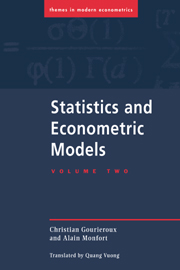Book contents
- Frontmatter
- Contents
- 14 Introduction to Tests of Hypotheses
- 15 Uniformly Most Powerful Tests
- 16 Unbiased Tests and Invariant Tests
- 17 Likelihood Based Tests
- 18 General Asymptotic Tests
- 19 Multiple Tests
- 20 Set Estimation and Confidence Regions
- 21 Inequality Constraints: Estimation and Testing
- 22 Nonnested Models
- 23 Asymptotic Efficiency
- 24 Asymptotic Theory
- Review of Linear Algebra and Matrix Calculus
- Review of Probability
- Index
23 - Asymptotic Efficiency
Published online by Cambridge University Press: 04 August 2010
- Frontmatter
- Contents
- 14 Introduction to Tests of Hypotheses
- 15 Uniformly Most Powerful Tests
- 16 Unbiased Tests and Invariant Tests
- 17 Likelihood Based Tests
- 18 General Asymptotic Tests
- 19 Multiple Tests
- 20 Set Estimation and Confidence Regions
- 21 Inequality Constraints: Estimation and Testing
- 22 Nonnested Models
- 23 Asymptotic Efficiency
- 24 Asymptotic Theory
- Review of Linear Algebra and Matrix Calculus
- Review of Probability
- Index
Summary
In preceding chapters, especially in Chapters 6, 15, and 16, we studied the optimal properties of general estimation and testing procedures in finite samples. On the other hand, in large samples the optimality problem was discussed in some special cases only. The goal of this chapter is to study such a problem more systematically.
The theory of asymptotic efficiency is technically difficult. It is also based on tools that are relatively different from those used up to now. For these two reasons we shall present the main results of this theory on an intuitive basis. In the same spirit of simplification the theoretical aspects will be discussed within a sampling framework. Then we shall consider successively the asymptotic optimality of estimators and the asymptotic optimality of tests. For each of these problems there exist different optimality concepts depending on the order of approximation retained in the asymptotic expansions. These concepts correspond to the properties of consistency, first-order asymptotic efficiency and secondorder asymptotic efficiency.
Asymptotic Comparison of Estimators
Hereafter we consider a random sample (Y1,…, Yn) drawn from a common probability distribution that belongs to a family of probability distributions parameterized by a parameter vector θ ∈ θ. We assume that the statistical model is homogenous and we let f(y;θ) denote the marginal probability density for one observation. The object of interest is the parameter vector θ.
It is natural to restrict a priori the study to estimators Tn(Y) that are consistent for θ. There exist, however, an infinite number of consistent estimators. To choose among those estimators, it is therefore necessary to invoke additional criteria based on the concept of asymptotic precision.
- Type
- Chapter
- Information
- Statistics and Econometric Models , pp. 325 - 382Publisher: Cambridge University PressPrint publication year: 1995

